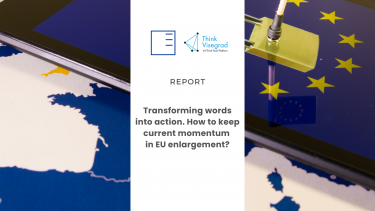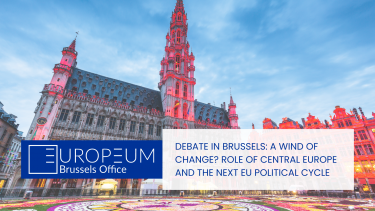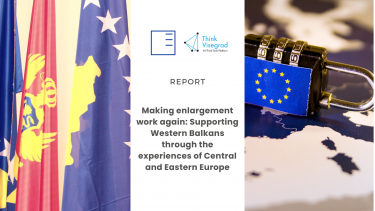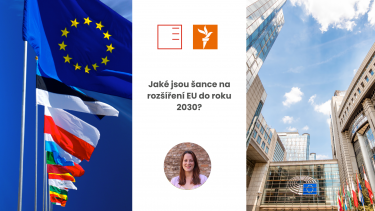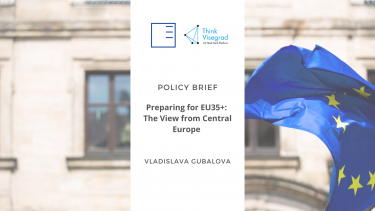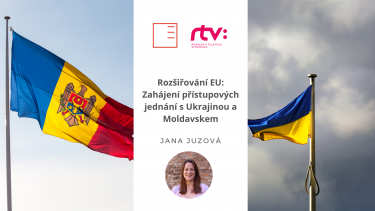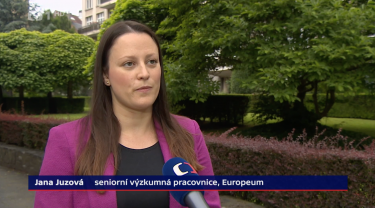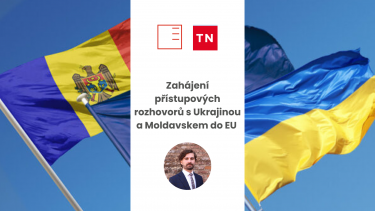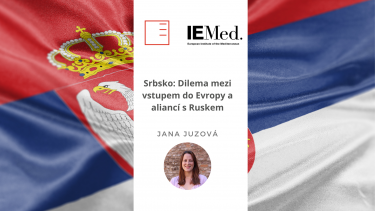Report | Transforming words into action. How to keep current momentum in EU enlargement?
On the 3rd of October, Think Visegrad in Brussels, represented by the Brussels Office of EUROPEUM Institute for European Policy, organized a discussion titled "Transforming words into action. How to keep current momentum in EU enlargement?". Experts from think tanks, diplomatic missions and EU institutions dwelled into the renewed focus on EU enlargement, including the initiation of accession negotiations with Ukraine and Moldova, the formulation of new strategies and financial incentives for candidate states, and reinforced commitments from the EU. The key challenge moving forward is ensuring that this momentum is sustained and translated into concrete, transformative actions that deliver measurable results.
Show more
Debate in Brussels | A wind of change? Role of Central Europe and the next EU political cycle
As the dust settles after a hectic period of post-election negotiations, Von der Leyen’s second Commission is faced with serious economic challenges. Recent reports of Draghi and Letta have clearly indicated that the EU is lagging behind other global powers in the areas of growth and competitiveness and this is reflected in the composition of the College as well as within strategic priorities for the next political cycle. Come listen and debate about challenges EU is facing!
Show more
Report | Making enlargement work again: Supporting Western Balkans through the experiences of Central and Eastern Europe
On September 12th, EUROPEUM’s Brussels Office organized a public conference titled “Making enlargement work again: Supporting Western Balkans through the experiences of Central and Eastern Europe”. Following a keynote speech by H.E. Bálint Ódor, the panel discussions dwelled on the 2004 enlargement, its impacts on the EU and the lessons learned from the process through the perspective of current EU accession of the countries of Western Balkans.
Show more
Radio Slobodna Evropa | What are the chances of EU enlargement by 2030?
The prospect of EU enlargement by the end of the mandate of the future European Commission looks more optimistic than at any time in the last decade. And barring the full membership of one new state, it is realistic to expect that at least one country will have concluded membership negotiations by the end of this decade and is just waiting for an acceptance date. Jana Juzová, a senior research fellow at EUROPEUM Institute, commented for Radio Slobodna Evropa.
Show morePolicy Brief | Preparing for EU35+: The View from Central Europe
Despite the historical support of EU enlargement policy by the Visegrad Four (V4), these Central European states are now faced with the challenge of reconciling their stances with the new realities of the process. As Ukraine and Moldova opened their accession negotiations, the EU seems to be torn on the questions associated with the future enlargement(s) - institutional reforms and changes within the EU budget. Transitioning from economic beneficiaries to potential contributors, the V4 states must evaluate the potential political and economic impacts of new members on both the EU and their domestic levels. Writes and proposes recommendations Vladislava Gubalova from GLOBSEC.
Show moreRTVS | EU Enlargement: Initiation of Accession Negotiations with Ukraine and Moldova
The European Union has initiated accession negotiations with Ukraine and Moldova. What does this mean for its inhabitants? How do the accession talks proceed? And what must the countries fulfill? Jana Juzová, a senior researcher at EUROPEUM Institute, comments for Slovak RTVS Television.
Show moreUdálosti ČT | Accession talks between Ukraine and Moldova and the EU
The European Union has initiated accession talks with Ukraine and Moldova. This decision was preceded by two years of negotiations. The accession process is expected to take several years. Jana Juzová, a senior researcher at the EUROPEUM Institute, commented on the topic for Evening News on Czech Television.
Show moreTN.cz | Ukraine and Moldova begin EU membership talks
In Luxembourg, formal accession negotiations with Ukraine and Moldova to the European Union have begun. Is this a significant progress towards their eventual EU membership? Which of these two countries has a stronger position? And how does the screening process unfold? Viktor Daněk, Deputy Director of EUROPEUM Institute, discussed these topics for TN.cz.
Show moreIEMED | Serbia: The Dilemma between European Accession and Alliance with Russia
With Ukraine’s defence against Russia heading toward a stalemate in the second half of the year and increased pressure inside the EU to deliver on its promises to provide the country with needed financial and military support, Serbia’s ambiguous relationship with Russia and the West has been brought increasingly into the spotlight in 2023. The Serbian Progressive Party (SNS), ruling since 2012, and President Aleksandar Vučić have been responsible for continued democratic backsliding and have failed to align with the Union’s foreign policy during Serbia’s lengthy EU accession process, pushing the situation closer towards a tipping point in Serbia-EU relations. Senior researcher at EUROPEUM Institute, Jana Juzová, describes this in more detail in her article for the European Institute of the Mediterranean.
Show moreRTVS | The European Commission recommends initiating accession negotiations with Bosnia and Herzegovina
The President of the European Commission, Ursula von der Leyen, announced that the European Commission will recommend initiation of accession negotiations with Bosnia and Herzegovina. In recent months, reform efforts have been evident, the Bosnian government has reached agreements even with the separatist entity of Republika Srpska on key reforms. However, the conditions have not yet been fully met, and many other reforms, such as electoral system reform, are still pending. Researcher from EUROPEUM Institute, Jana Juzová, discussed it for Slovakian RTVS.
Show moreStaroměstské náměstí 4/1
Prague 1 - Staré Město
110 00
tel.: +420 212 246 552
email: europeum@europeum.org
https://www.europeum.org
